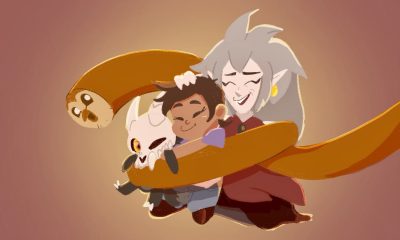Spoilers ahead for “The Owl House.”
It was a typical Saturday. I decided to relax. I spent most of my time on my phone. While scrolling through TikTok, I caught sight of a new episode of one of my favorite shows, “The Owl House.” The episode’s title, “Watching and Dreaming,” was eye-popping. I dropped everything, raced to my computer, and laid down with snacks to watch the episode.
I was left an absolute sobbing mess by the end of it.

“Watching and Dreaming” was the series’ final episode, and it felt like it. Some aspects were clearly rushed since Disney chose to cancel the show, but the storylines had a satisfying conclusion. There was a glimpse into a character that had been teased for a while. Seeing the final looks of the main characters was pleasing.
My friends weren’t surprised when I sent them texts about my love for the show. I could talk for hours about it if no one chose to change the subject. Side note: good friends will let you talk about random things for hours and are willing to listen to your excitement. Anyways, there is a specific reason why I have such a strong sense of love for this show.
Aspects of my childhood were stripped away from me at an early age — a lot of that being a story of its own. I was never given the opportunity to be a child growing up, so now I attempt to regain some of those childlike experiences within my years in college. Sitting down and enjoying a cartoon is one of them.
Younger me would have loved “The Owl House.” The fluid animation, use of magic (which I was a huge nerd of), and especially the character’s identity would have comforted me back then.
One of the main reasons I love this show is because of the cast. Each member has different racial, ethnic and sexual identities. The show is progressive but not performative. Numerous characters in the show are queer, and they are proudly presented. The main character gets with her former bully then friend, Amity. What’s deceptively profound is that the queer characters are allowed to exist peacefully. Any hatred thrown towards them is done by characters who are meant to be the villains.
I can heavily relate to the main character, Luz. She struggled to do good and be taken seriously in the human and demon realms (the Boiling Isles). Luz wants to stay in the Boiling Isles for so long because she feels extremely isolated from her peers back home due to her overactive imagination.
When Luz arrives in the Boiling Isles, she finally finds a place that understands her for who she is. She felt like she could be the most authentic version of herself. When minority characters are brought into a show, the creators tend to write them stereotypically.
Luz, an Afro-Latina character, could have been written as someone cruel, someone who loves to dance or a huge flirt. The sort of stuff usually associated with Black and Latina characters. Luz is characterized as an extroverted, nerdy girl with a huge heart. I can relate to this. Both of us being bisexual is a plus.
What really makes me love this show are the family themes. Biological families and their closeness are essential, but so is a found family. Luz finds family within her mentor, Eda the Owl Lady, and her titan friend King. Characters like Hunter and Amity are her family too. Hunter and Amity come from separate, toxic households and learn to find love and friendship.
I focused so heavily on “The Owl House” because I was so sad to see it go. Each episode means a lot to me. It’s more than an animated show. It told a story of a person like me trying to fit in.
















































































































